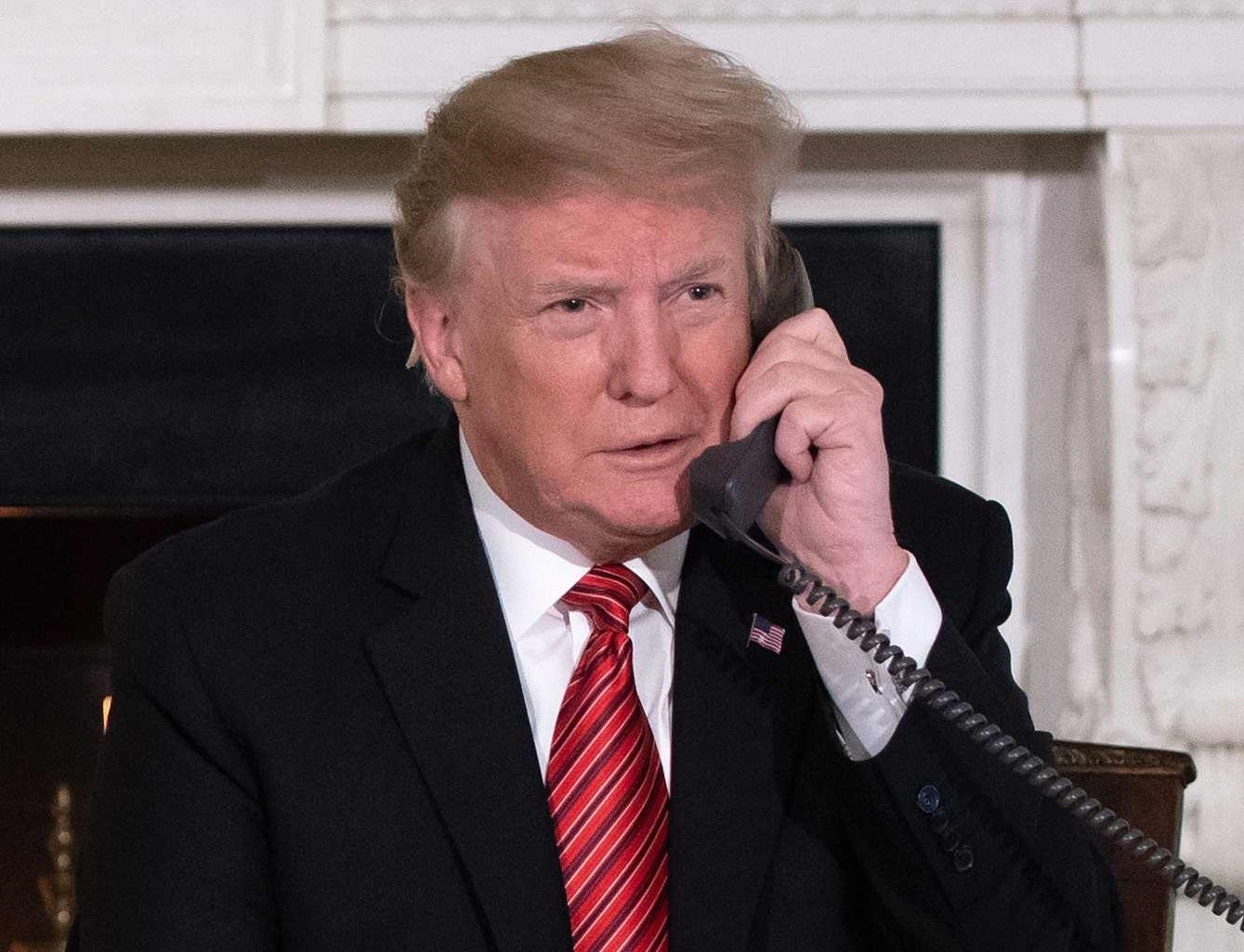‘I would like you to do us a favour though…’
In the 15th instalment of our series recapping an unprecedented presidency, Joe Sommerlad looks at the first of the president’s two impeachments, this one for attempting to squeeze a bogus inquiry out of Ukraine in exchange for aid


On 24 September 2019, House speaker Nancy Pelosi convened a press conference to tell the world she was launching an impeachment inquiry against Donald Trump in response to a complaint raised against him by an anonymous CIA whistleblower.
The issue related to a call Trump had placed with Ukraine’s new president, Volodymyr Zelensky, on 25 July, in which the American appeared to proposition his counterpart in eastern Europe with a quid pro quo, suggesting $400m in congressionally approved US military aid to Kiev would be withheld unless Zelensky’s government launched a politically embarrassing anti-corruption probe into Trump’s own domestic rival Joe Biden, who was then leading the field to challenge him in 2020.
“I would like you to do us a favour though…” was how the president had introduced his condition on the call, pressuring Zelensky to pursue a conspiracy theory alleging that Biden, while serving as US vice president, had sought the dismissal of a Ukrainian prosecutor investigating a gas company, Burisma, on whose board his son Hunter sat.
Earlier in the year, Trump’s personal attorney, Rudy Giuliani, had visited the country in search of dirt on the Bidens himself, an uncomfortable echo of the clandestine Trump Tower meeting of 2016 seeking smears against Hillary Clinton.
The House Intelligence, Oversight and Foreign Affairs committees began interviewing State Department, Pentagon and National Security Council (NSC) officials behind closed doors throughout October, piecing the truth together from their depositions before summoning several back to testify in public across a series of dramatic mid-November hearings.
As he had with Robert Mueller, Trump denounced House Democrats’ investigative efforts as another “scam”, a second “witchhunt” – or just plain old “bulls***”.
His GOP allies like Matt Gaetz meanwhile attempted to sabotage proceedings with a sequence of dumb stunts, the Floridian notably getting himself kicked out of Russia expert Dr Fiona Hill’s deposition before leading a western-style posse to “storm” Pentagon adviser Laura Cooper’s hearing in the Capitol’s Sensitive Compartmented Information Facility (sound familiar?), occupying the chamber for five hours and ordering in pizza before peace was restored.
“What we see in this impeachment is a kangaroo court and chairman [Adam] Schiff is acting like a malicious Captain Kangaroo,” a deeply confused Gaetz told reporters after Schiff had booted him out of a session he had no right to attend.
While cabinet members closed ranks and ignored subpoenas from the committees, the president’s acting chief of staff Mick Mulvaney scored a spectacular bicycle kick of an own goal during a White House press conference in which he blubbed the phrase “...and that’s why we held up the money” in front of a room full of shocked reporters.
Mick Mulvaney scored a spectacular bicycle kick of an own goal during a White House press conference in which he blubbed the phrase ‘…and that’s why we held up the money’
The impeachment inquiry’s public phase introduced a memorable cast of characters, including former ambassador Marie Yovanovitch, Ukraine charge d’affaires Bill Taylor, displaced Durhamite Dr Hill, the nattily bowtied George Kent, Mike Pence aide Jennifer Williams, decorated NSC director Lt Col Alexander Vindman in full dress uniform, and ambassador to the EU Gordon Sondland, a smirking ex-hotelier who had donated $1m to the Trump campaign for the privilege of ending up in this hot mess.
We might also include in that list New Jersey drag queen Pissi Myles, who arrived in an enormous blonde wig and retro red leather mini dress to watch events unfold in the Longworth Office Building from the cheap seats.
Sondland aside, the witnesses themselves were impressive, principled specialists in their fields and did themselves every credit; the Trumpoid goons like Devin Nunes, Jim Jordan, Doug Collins, Elise Stefanik and Louie Gohmert tasked with challenging them rather less so.
They tried every ploy in the book: complaining their chairs were uncomfortable, that the hearing room was drafty, and that chairman Jerrold Nadler’s gavel was too loud, even attempting to whip up a faux outrage when Stanford constitutional law professor Pamela Karlan made a very mild joke about Trump’s son Barron’s name, saying the remark “made her look mean”.
Trump himself made an appalling intervention when he unwisely attacked Yovanovitch on Twitter while she was giving testimony about having been forced out of her post in May (it would later emerge that Giuliani had pushed for this, having had her spied on by two heavies named Lev Parnas and Igor Fruman, allegedly with Trump’s sign-off).
Chairman Schiff got word of it and read the post aloud to the veteran diplomat, asking how she felt.
“Very intimidated,” she answered, as congressman Eric Swalwell pointed out that surely this blatant act of live witness intimidation was in itself grounds for impeachment.
It was all to no avail, however.
The house went on to formally accuse the president on two counts, abuse of power and obstruction of Congress, on 10 December.
Eight days later, representatives backed both articles, casting their votes largely along party lines and pushing the matter forward to a trial in the Republican-held Senate, where Grim Reaper McConnell’s scythe held sway.
The GOP had largely acted as one so far, insisting the whole business was an intricate Democratic plot, and looked even less likely to behave independently now.
Adam Schiff – regularly attacked as “Shifty Schiff” and “Pencil-Neck” by the president, whose re-election team even sold vulgar official T-shirts bearing those slogans – was chosen to lead the case for the prosecution.
Trump’s motley crew of defenders included Bill Clinton impeachment prosecutor Ken Starr, celebrity lawyer Alan Dershowitz (like his boss, in hot water over a friendship with billionaire paedophile Jeffrey Epstein) plus White House counsel Pat Cipollone and private attorney Jay Sekulow.
No matter how carefully the Democrats made their case, the result was never really in doubt – even though only a handful of conscientious Republicans switching sides would have swung it – with calls for the likes of Parnas and John Bolton to be subpoenaed to add their testimony quickly shot down.
Red senators Lamar Alexander, Lisa Murkowski and Susan Collins all hinted to the press that they might be the ones to defy Trum, with Collins issuing her customary declaration that she was “very concerned” before changing tack and assuring us, improbably, that the president had “learnt his lesson” from the Zelensky affair.
In the end, it was Utah senator Mitt Romney alone, the party’s 2012 presidential candidate, who voted against the incumbent on 5 February 2020, the Mormon earning the enmity of Trump for life.
The night before, the president had given what would prove to be his final State of the Union address, an evening best remembered for Nancy Pelosi tearing up her copy of Trump’s speech as soon as he had concluded, signalling her disgust at the following day’s inevitable verdict and surpassing even her bitterly ironic applause at the same occasion precisely one year earlier.
Jubilant at his acquittal, Trump celebrated by vindictively firing witnesses Sondland and Lt Col Vindman and crowing on Twitter. Intelligence Community inspector general Michael Atkinson, who handled the initial complaint, would follow them out of the door in April.
The sacking of Lt Col Vindman, a Purple Heart recipient, was particularly disgraceful.
His opening statement to the hearings on 19 November had been profoundly moving, the veteran reassuring his father, an emigre from the USSR, that he had nothing to fear.
“Dad, my sitting here today, in the US Capitol talking to our elected officials is proof that you made the right decision 40 years ago to leave the Soviet Union and come here to the United States of America in search of a better life for our family,” he said.
“Do not worry, I will be fine for telling the truth.”
Incredibly, these historic events would be repeated in a blockbuster sequel even more dramatic than the first.
Read the full The Trump Review series here
Join our commenting forum
Join thought-provoking conversations, follow other Independent readers and see their replies
Comments


Bookmark popover
Removed from bookmarks